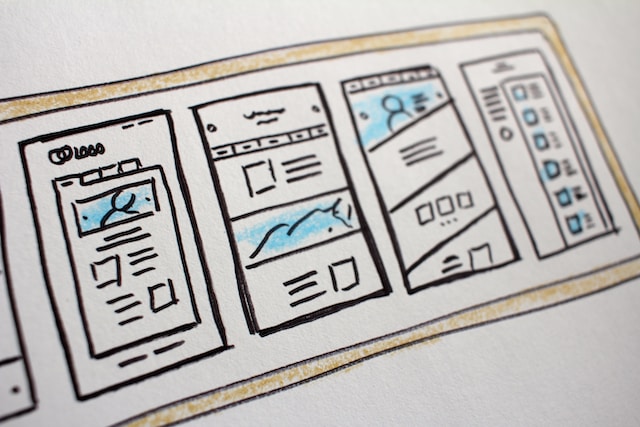In the digital age, having an online presence is more important than ever for mental health professionals. A website can significantly impact a therapy practice’s growth and client reach, but “does my therapy practice need a website?” is a question many therapists ask themselves.
Let’s dive into the pros and cons of having a website for your therapy practice, and whether it’s the right choice for you.
Key Takeaways
- Weigh the pros and cons of a basic web presence or dedicated therapy website to determine what’s best for your practice.
- Leverage features such as FAQs, helpful resources, client portal & contact info access link on your website to facilitate communication & admin tasks while improving user experience.
- Consider cost/benefit analysis and digital marketing tools when deciding to invest in a website for your therapy practice.
Decoding the Digital Age for Therapists: Is a Website Necessary?

Use your website to bring in new clients and keep retention rate high for your current clients.
In the era of digital technology, those needing a website might find it a beneficial tool for therapists, providing access to a broad clientele, some of whom may not need therapy at present or may lack access to care.
Most therapy clients search for therapists online, so a website becomes integral to a private practice’s marketing strategy. Nevertheless, the decision to adopt a website for your practice should be based on carefully evaluating potential pros and cons.
Many therapists opt for a website because it offers a “hub” for all of their marketing activities, including Google Ads, blog content, and additional resources for both current and prospective clients. A well-designed and informative website can help you attract new clients, streamline administrative tasks, and even provide a platform for marketing your practice to a broader audience.
However, a website also requires time, effort, and financial investment for maintenance. That’s why we’ve created therapy website service packages that are all-inclusive, so you can focus on your business while we focus on your digital presence.
Weighing Your Practice’s Online Presence Needs

Build a therapy practice’s marketing strategy based on the numbers of what’s working
With the proliferation of digital technology, it’s necessary for therapists to establish a basic web presence to be discovered online by potential clients. Directory listings and Google My Business profiles can enhance your practice’s visibility in search results while providing important information to potential clients. Yet, a dedicated therapy website offers greater control over your online presence and extends marketing capabilities beyond the basics.
To determine the best course of action for your practice, it’s essential to weigh the benefits of both a basic web presence and a dedicated therapy website. Let’s explore the differences between these two options and how they can impact your practice’s growth and client reach.
The Basic Web Presence Imperative
A basic web presence, such as a directory listing or social media profile, is essential for therapists to be found online by potential clients. Platforms like Gator website builder, Squarespace, and Wix can help you create a simple yet professional website that meets your basic needs. Additionally, maintaining an active presence on social media platforms like Facebook, Twitter, and Instagram can help therapists reach potential clients and showcase their expertise.
Directory listings can also be advantageous for therapists looking to establish a web presence, as they can increase local visibility and make it easier for potential clients to find them on search engines like Google. However, unlike directory listings, a dedicated therapy website allows for more control over the content and design, which can lead to a more personalized experience for website visitors.
Beyond Basics: The Case for a Dedicated Therapy Website
A dedicated therapy website offers numerous advantages, such as:
- Showcasing your unique qualities as a therapist
- Providing more detailed information about your services
- Supporting your marketing efforts
- Creating an emotional experience for potential clients that is difficult to achieve through other online platforms.
While a basic web presence is essential for any therapy practice, a dedicated website can bring additional benefits, such as attracting the right clients, offering more control over your online presence, and supporting your marketing activities, such as SEO and content marketing. Ultimately, the decision to invest in a dedicated website depends on your individual marketing goals, workload, and the potential benefits it can bring to your practice.
The Client’s Journey: How a Website Influences Prospective Clients

A website should start with your therapy practice’s clients in mind
A well-designed and informative website can influence prospective clients by providing essential information about your therapy services, answering common questions, and establishing an emotional connection before the first session. This can help potential clients feel more comfortable reaching out to you, knowing what to expect, and ultimately choosing you as their therapist.
A website offers valuable information about your practice and allows prospective clients to get a sense of your personality and approach to therapy. This emotional connection can be a significant deciding factor for clients when choosing a therapist, making investing in a website that accurately represents you and your practice even more crucial.
Essential Features for a Successful Private Practice Website
A successful private practice website should include these essentials to help your clients find the information they’re looking for:
- FAQ section for frequently asked questions
- Helpful resources for the most common questions clients have
- Your office hours and contact information
- An introduction to you, your staff, your experience, and the focus of your private practice
- A clear “Call-To-Action” or information about their next step to meet with you
These features not only improve the user experience for prospective clients but also streamline communication and administrative tasks for you as a therapist, benefiting your current clients as well.
We should further examine the significance of these features and their contribution to the success of a private practice website, especially in terms of private practice marketing.
Services FAQs & Helpful Resources
Including services FAQs and helpful resources on your therapy website can save time and provide a better experience for prospective and new clients by answering common questions upfront. These resources can cover topics such as your approach to therapy, office policies, and insurance information. By answering these questions on your website, you can alleviate potential concerns and make it easier for clients to decide if your practice fits them.
In addition to FAQs, offering helpful resources such as articles, videos, or downloadable media related to mental health can showcase your expertise and provide valuable information for potential clients. This helps establish trust and credibility and encourages website visitors to explore your content further and engage with your practice.
Client Portal & Contact Information Access Link
A client portal and contact information access link can significantly enhance the user experience of your therapy website. The client portal provides essential resources such as:
- Secure communication
- Digital forms
- Appointment management
- Treatment plans tailored for your clients by your therapy private practice
This streamlined approach can benefit you and your clients by simplifying administrative tasks and making it easier for clients to access necessary information.
Having an easily accessible contact information access link on your website helps potential clients get in touch with you quickly and conveniently. This accessibility encourages potential clients to engage with you, increasing the likelihood of successful client-therapist relationships. By providing multiple points of contact and a user-friendly client portal, you can create a seamless experience that caters to your clients’ needs and fosters strong relationships.
SEO and Content Marketing: Attracting the Right Clients

Implementing “search engine optimization” (SEO – optimizing your website to appear in search engine results) and content marketing strategies – like creating blog posts that are searchable – can help therapists attract the right clients and improve their website’s visibility in search engine results.
Here are some ways to achieve this:
- Create high-quality, relevant content that speaks to your target audience through your blog
- Use keywords strategically throughout your website
- Optimize your website’s meta tags and descriptions
- Build backlinks from reputable websites
- Use social media to promote your content, link back to your website, and engage with your audience
By following these strategies, you can boost your website’s ranking and make it more likely for potential clients to find you when they search for therapy services online.
Investing in SEO and content marketing can:
- Attract the right clients
- Establish your practice’s credibility and expertise in the field
- Provide valuable content that addresses the needs and concerns of your target audience
- Demonstrate your understanding of their challenges
- Position yourself as a trusted resource in the mental health community
The Cost-Benefit Analysis of Website Maintenance
Before investing in a website for your therapy practice, it’s important to consider the costs and benefits of website maintenance. This involves weighing factors such as time, effort, and financial investment. Although a website can provide several benefits, like attracting new clients and simplifying administrative tasks, it’s vital to assess whether the investment is feasible for your practice.
The costs associated with website maintenance can vary depending on your practice’s specific needs and requirements. It’s essential to prioritize website security to protect confidential client information and consult with a web developer or security expert to estimate the costs. By carefully considering the costs and benefits of website maintenance, you can decide whether a website is the right choice for your therapy practice.
Digital Marketing Tools for Growth

There are so many digital marketing tools to reach your therapy clients. Where should you start?
Digital marketing tools, such as paid online advertising and email marketing, can help therapists grow their practice and reach a wider audience. These tools can complement your website, amplifying your online presence and attracting potential clients who may be searching for therapy services online.
Email marketing, in particular, can be a powerful tool for therapists, allowing you to build relationships with potential clients and promote your services. By leveraging these digital marketing tools alongside your website, you can enhance your practice’s visibility and attract the right clients, ultimately contributing to your practice’s growth and success.
Building Relationships and Offering Emotional Experience
A website can play a significant role in building relationships with potential clients and offering an emotional experience that is difficult to achieve through other online platforms. Your website can create an emotional connection with potential clients by providing a welcoming and calming design, clear and concise information about your therapy services, and showcasing your unique qualities as a therapist.
Additionally, interactive features such as live chat, online forums, or virtual support groups can help create opportunities for clients to engage with you and your practice online. By fostering these emotional connections and relationships through your website, you can create a strong foundation for successful client-therapist relationships and a thriving therapy practice.
The Verdict: Does Your Practice Need Its Own Website?
The decision to establish a website for your therapy practice hinges on your individual marketing objectives, workload, and the potential advantages it can offer your practice.
A website can enhance your professional credibility, highlighting your unique qualities and aiding your marketing initiatives. However, balancing these benefits against potential downsides, such as the time, effort, and financial investment required for website maintenance is essential.
By carefully evaluating the costs and benefits of a website for your therapy practice, you can make an informed decision that aligns with your marketing goals and workload. Whether you invest in a dedicated website or rely on other marketing strategies, the most crucial factor is ensuring that your practice’s online presence effectively reaches and engages your target audience.
Frequently Asked Questions
Do you need a website as a therapist?
Having a website is essential for therapists to have successful businesses and a high quality of life. A great website can help advertise, market, and generate clients, but it also does much more.
Should a therapist have a blog?
Having a blog can be a useful tool for therapists to refine their focus and increase their knowledge and expertise. It can help build confidence when discussing specific challenges with potential clients, and builds credibility when someone learns about the therapist through reading their written blog content.
Having a blog also gives the added benefit of giving Google more content to include in search results, give your SEO a larger footprint.
How can a website influence prospective clients’ decisions to choose a therapist?
A website can equip prospective clients with essential information, answer common questions, and create an emotional connection that can influence their decision to choose a therapist.
How can digital marketing tools like paid online advertising and email marketing help therapists grow their practice?
Digital marketing tools, such as paid online advertising and email marketing, can boost a therapy practice’s online visibility, attract potential clients, and ultimately help grow their practice.
Looking for a proven website strategy that is completely done for you? Check out our $0 up front website service packages.
